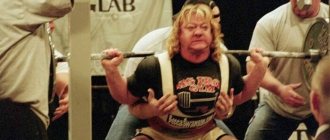Attention! By 2030, more than 57 professions will disappear, and wages in many areas will fall. Professions of the future with high salaries are taught online. GET STARTED FOR FREE, it's easy.
It's time to look at your personality strengths on your resume. As a rule, they are indicated together with shortcomings and together give a complete picture of the applicant. But there are principles for writing benefits correctly that increase the likelihood of an employer response.
For many, getting a well-paid position is their life's work. It is important for an employer to collect as much useful information as possible about a potential employee, in addition to basic information about work experience, education and professional skills. The boss wants to understand how the applicant feels about the job, how he communicates with the team and clients, and what career goals he sets for himself.
Expert opinion
Ekaterina Troitskaya
HR manager
I have to deal with a meaningless set of phrases in a resume; behind all this “garbage” I rarely manage to discern a person’s personality. Build a profile so that you can get an idea of your true strengths. But write honestly.
After talking with the applicant during an interview, if the boss reveals the deception, this will become a serious reason not to hire the liar. As a result, the unfortunate employee will have to regret the time spent on the interview.
Character strengths should be presented briefly, but based on facts and the ability to prove their existence. And weak traits are to complement the image of a diligent worker.
Strengths and weaknesses of a person
The strengths and weaknesses of a person are closely related and should not contradict each other. Each person has their own disadvantages and advantages. As a rule, we are used to talking about strengths, but we are often silent about weaknesses.
An independent, goal-oriented and self-critical person always recognizes that there are many weaknesses in his character. And there's nothing wrong with that. We are all humans. But every purposeful person can turn his shortcomings into advantages through painstaking work on himself.
So, what are a person's strengths and how to find them? To do this, first of all, pay attention to your talents and skills. This is where you will find your strengths. When you have found your advantages, pursue them and develop them. This will allow you to open up to your fullest potential.
If you cannot independently determine your strengths for the questionnaire, ask your acquaintances and friends for help. Thanks to their opinions, you may discover advantages in yourself that you were not aware of before. And in some ways your opinion will agree with the opinion of your friends.
In addition to the strengths on your resume, there is often a question about your weaknesses. There is no need to be ashamed of them. If you claim that you have no negative character traits, this will become a sign to the recruiter of an undeveloped personality. Which is unlikely to help you get the desired position in the future.
Table 1 - Strengths and weaknesses
| Your strengths if you: | Your weaknesses may include: |
| Results-oriented | Inability to remain silent in time |
| Tenacious | Excessive emotionality |
| Hardworking | Lack of willpower |
| Strong-willed personality | Shyness |
| Confident | Inability to speak in public |
| Sociable | Excessive irritability and aggressiveness |
| Organized and independent person | Inability to say “no” |
| You perceive information well | Formalism |
| Learn quickly | Hyperactivity |
| Responsible for their own actions and the actions of their subordinates | Fear of traveling by air and sea |
| Disciplined | Inability to lie |
| Love your profession and work | Integrity |
| Active and energetic person | Lack of flexibility |
| Patient | Modesty |
| Honest and don’t like to lie | Excessive self-criticism |
| You have organizational skills | Straightforwardness |
| Have a creative mind | Love for formalism |
| Punctual | Pedantry |
| Are you a good performer? | Self-love |
| Scrupulous | Impulsiveness |
Examples of successful answers to the question “What are your strengths”
Example 1
Strength: leadership qualities
“I have always shown myself to be a born leader. I have 10 years of experience in finance and sales and have exceeded all key performance indicators at the end of each reporting period. Over the past 4 years, I have been promoted three times.
Of course, this is not solely my merit. I always select only highly qualified specialists for my team. And I am proud of my ability to see potential in an employee.
I never stand still, I work on myself and develop my management skills. In this position I plan to further improve my leadership skills.”
Example 2
Strengths: communication skills and result-oriented:
“I prefer to work in a team, I make contact easily, I know how to collaborate and work together with colleagues.
At Company X, I worked in various project teams that were creative and performed a variety of technical tasks. But this did not stop me from achieving a promotion - for the last 2 years I was in charge of the technical department. During this time, I was able to achieve an increase in the company’s production capacity by 20%.”
Example 3
Strengths: responsibility, organization and discipline:
“I consider my strengths to be responsibility and discipline, I easily obey the rules, and I work conscientiously. I just can't do it any other way.
I remember there was a case when my colleague forgot about the project, and there was only one day left before the deadline for submitting the material. The editor-in-chief asked me to at least try to somehow rectify the situation. Since the article was important for our newspaper, I immediately set to work and was able to complete it on time. By the way, the article turned out to be of high quality and our reader received it with a bang.”
Exceptions to the rules
When applying for a job, indicate in your resume those strengths that will help you get the desired position. After all, some of your strengths for a certain position may turn out to be weaknesses that an applicant should not have.
Here are the most common examples. To get a manager position, you shouldn’t talk about your ability to sing. This is unlikely to help you get a job. But if you tell a hiring manager that you are a good cook, this will indicate your discipline, creativity, perseverance and accuracy. After all, to prepare a new dish you need to spend a lot of effort and time on choosing products and on the direct cooking process. In addition, a good cook is always creative in creating a new masterpiece, but always follows it exactly in accordance with the culinary recipe.
Below we will give several examples of what qualities must be specified when applying for a particular position.
Table 2 - Strengths and weaknesses by specialty: examples
| Strengths | Weak sides |
| If you are applying for the position of accountant, then you: | |
| Assiduous | You don't know how to lie |
| Attentive to details | Always straightforward |
| Disciplined | Scrupulous |
| Punctual | Principled |
| Hardworking | Distrustful |
| Honest and decent person | Modest |
| If you are applying for a leadership position, you: | |
| Initiative | Hyperactive |
| Active | A person with high demands |
| Goal oriented | Scrupulous |
| Assertive | Principled |
| Have leadership qualities | Pedantic |
| Love to develop and learn new things | |
| Confident | |
| If you are an applicant for creative vacancies, you: | |
| Have a creative mind | Hyperactive |
| You know how to work for results | Modest |
| You know how to soberly evaluate your work | Emotional |
| Initiative | |
| If you are applying for a manager or office employee position, you: | |
| Sociable | Are you afraid of flying? |
| Results-oriented | You don't know how to lie |
| Can you listen? | Principled |
| Confident | Hyperactive |
| Speak competently | |
| Punctual | |
| You know how to find a way out of difficult situations | |
| Attentive and polite | |
| Responsive | |
| Have a creative mind | |
The table shows that not all positive aspects should be indicated in a resume, since some are simply not needed to obtain the desired position or can be “harmful.” For an employment application, we recommend that you select such weaknesses that will help characterize you as a responsible person and worthy of holding this position. The negative qualities of your character should help you perform the functions assigned to you.
Tips for getting the best interview result
- Prepare your answer in advance: Listing your strengths will help you answer this question confidently and beautifully.
- Communicate your strengths: Focus on a couple of strengths that directly relate to the role and the company. A focused, relevant answer with one or two examples will impress your interviewer.
- Share what you offer: Keep your answers to the point and focus on the qualities you will bring to the job and the company. Your goal is to explain to the employer why they should hire you.
What else should you pay attention to in your application or resume?
During the interview, we recommend that you also indicate “general” strengths.
- Be sure to indicate in your resume that you always set goals for yourself and achieve them, that is, you are a goal-oriented person. At the same time, you show persistence and always follow the pre-drawn plan.
- It is also worth pointing out that if unforeseen circumstances arise, you will be able to find a way out of the current situation - you have creative thinking.
- Another important component of any successful applicant is self-confidence. This will characterize you as a confident person who is not afraid to take a step forward. You are not inclined to panic due to unforeseen circumstances; you are calm and confident in your abilities.
- The ability to communicate with people is also very important. Let it be clients, colleagues, subordinates, suppliers. You just need to be able to find a “common language” with them, accept their point of view and correctly present your opinion.
- Another positive character trait that must be indicated in the employment application is responsibility. Whatever position you apply for, you must always be responsible for your actions. Otherwise, you will become a burden to the company, which will ultimately lead to your termination.
Also, when applying for a new position, indicate that you are highly trainable. You can give examples from your past work or university practice. When you come to a new company, at first you will need to study: learn about the company, the features of its activities and learn how to fulfill your direct responsibilities.
Examples of answers to the employer’s question “What are your weaknesses”
Example 1
Weakness: self-criticism
“I can be overly critical of myself. Throughout my career, I have noticed the same pattern: no matter how well I complete the task, I still feel that I could have done it even better. The result is burnout.
I decided I needed to do something about it and started working on my self-confidence. Therefore, over the past two years, after I finish working on a project, I try to take a break: I celebrate my achievements and praise myself for the work I have done. This also helped me in that I began to treat my colleagues differently, notice their successes and rejoice in common victories.”
Example 2
Weakness: procrastination or tendency to constantly put things off “until tomorrow”
“I have a negative character trait - putting everything off for later. I used to always think that procrastination was just my problem. But while working as an engineer at company X, I realized that my entire team began to suffer because of my habit. Colleagues were stressed about whether we would be able to complete the project on time. And, as a result, the atmosphere in the team became tense.
At that moment, I realized that it was time to change something, it couldn’t continue like this, otherwise I would lose my job. I began to make myself a list of tasks for the day and complete them in strict sequence. Thanks to this kind of planning, I became much more organized.”
Example 3
Weakness: fear of public speaking
“Completing a project and preparing a presentation for it is a piece of cake for me. But when it comes to speaking in front of colleagues or potential investors, all my confidence evaporates.
Our department head knew about this problem and usually asked someone from the team to come forward and present the project. And then one day, listening to the speech of my colleague, I realized very clearly that only I myself, its author, can present my project, my brainchild in all its details, with all the details and nuances.
I began to prepare for the performance in advance, rehearsed and even recorded myself on video. This helped me look at myself from the outside and notice mistakes - my voice trembled, my intonation was wrong, there was no eye contact, etc. Now, the more I speak in public, the more confident I become.”
How do you develop yourself as a specialist?
It is believed that a good specialist never stops learning. Think about the ways in which you maintain your skills at the proper level. It can be:
- courses, private lessons;
- professional literature;
- specialized articles;
- trainings, conferences;
- industry news.
Perhaps in your career you prefer to take on non-standard tasks and master new approaches - this can also be indicated, preferably with examples.
How to pass an interview: the most important thing in 3 minutes
How do you rate your past place of work?
As we already mentioned, you cannot say anything negative about your past companies, teams and bosses. Even if they were really out of the ordinary. Any unflattering comment can work against you.
But it’s also not advisable to talk too “sweetly” either. As in many other cases, we are looking for a middle ground. Just note that the atmosphere in the company was friendly. If you want to tell us in more detail (or if you are asked to do so), note a couple of pleasant things: for example, that the employer gave adequate feedback to employees or that tasks were always distributed correctly, and everyone in the team tried to support each other.
What salary do you want to receive?
This is one of the questions that needs to be approached carefully and wisely. You need to not only name the amount of your desired salary, but also justify it. And to do this, you need to study the labor market, evaluate your abilities, find out how much people in your specialty are paid in your region.
If you overestimate the number, it may cost you a job offer; if you underestimate, you will end up not receiving a decent salary or will create the impression of a not very valuable employee who is ready to work for pennies.
Some recruiters themselves name the amount they are willing to pay you, but this does not always happen. Most often, they ask to know whether they can “afford” such an employee.
Your task is to think in advance about the fair amount of the desired payment for your work.
Why did you choose this specialty?
If you are truly passionate about your business, answering this question should not be difficult for you. Most often it is asked to young professionals who do not yet have much career experience, but whose motivation is very important to understand.
What might the answer be:
- You have dreamed of this kind of work since school, and this is what you like to do most;
- Your parents or friends are engaged in this activity, and you followed their example;
- During your studies, you demonstrated the greatest success in this area;
- You have passed career guidance testing, and this specialty suits you perfectly.
It is important to show that you are in this profession for a reason, that you really plan to do this for a long time and fruitfully.
What are your career goals?
If a recruiter asks you about your dream, he not only wants to learn more about you as a person and a specialist, but also to understand whether your ambitions coincide with the values and capabilities of the company. As with the question of where you see yourself in n number of years, it is important to talk about realistic things.
Options for answering the question about professional goals:
- release a quality product, complete a useful project;
- grow vertically or horizontally in your career;
- learn new programs, apply new approaches;
- work in an international company and so on.
Answers like “I want to earn this much money” will not work. This is not the best motivation, especially in the eyes of employers.
Where do you see yourself in 5 years?
Traditional interview question. Instead of 5 years, there could be 3 years or 10, but the point here is the same - to find out about your plans, about the presence or absence of a career strategy. Here, when answering, you need to be as specific as possible (without vague formulations like “I may change my field of activity” or “It all depends on the circumstances”), but not be unshakable (“I must get a promotion within 2 years”). And, of course, you definitely cannot say that you are not planning anything in the long term.
What can you tell us about your plans for the coming years:
- what duties would you like to perform;
- what skills to master/improve;
- what position do you plan to grow to;
- what courses do you want to take;
- What benefit can you bring to the company during this time?
Also, remember to keep your answer realistic.
You shouldn’t say that you want to achieve some exorbitant heights, so as not to appear too self-confident. It is also worth studying information about the company to understand the speed at which you can advance in your career and what opportunities are generally available for employees.
Do you have any children?
Another one of the “inconvenient” questions. It is most often asked to women. And the answer here, of course, must be truthful, but at the same time satisfy the recruiter. How to do it?
If there are children
Please note that there is someone to look after the child (nanny, grandmother), that at your previous job there were no problems with this and it did not interfere with your duties. At the same time, if you know that you will really need to often take time off or sick leave for the sake of your child, it is better to admit it honestly - after all, this will happen anyway, and then you will have to set priorities.
If there are no children
In this case, the recruiter may be concerned about your possible maternity leave. The standard answer here is “I don’t plan to have children in the near future.”
Common mistakes
When compiling a list of positive and negative qualities in your resume, be extremely careful. The choice of characteristics is determined by the desired position and the internal culture of the company.
It is important that these personality traits are perceived in a positive aspect, and not as shortcomings. For example, for an accountant, leadership abilities and charisma are undesirable, and in a creative team, pedantry and modesty will be a “minus”
For example, for an accountant, leadership abilities and charisma are undesirable, and in a creative team, pedantry and modesty will be a “minus”.
To avoid mistakes in describing personal qualities, follow the recommendations of experienced personnel officers:
Don't just use template phrases. Convey in your own words, in a discreet manner, your personal character traits. Exclusively for creative professions, you can use humor and creativity in your resume. Do not indicate more than 5 characteristics. Try to avoid vague, general phrases, for example, talented, responsible. It’s better to choose an individual character trait that exactly suits you and the desired position.
Draw the employer's attention to personal qualities that are easy to immediately check, for example, energetic, sociable. When characterizing negative qualities, you should not evade the answer
It’s better to name several options and indicate how you are working on them, how you are improving your character.
How do you feel about working overtime?
It all depends greatly on your actual situation. After all, it will be very awkward if you say that you are ready to work overtime, and then you cannot do it. But by saying that you don’t like processing, you show your indifference to the company’s potential problems.
Therefore, we recommend finding a middle ground: “I’m not ready for this on a regular basis, but if circumstances require it, I can stay after 18:00 or work on additional tasks at home.”
If you are a workaholic and can really almost spend the night at work, then you won’t need any “buts” here.
Well, if you still categorically do not want to work beyond the schedule, say so honestly to avoid problems in the future.
What's your hobby?
Personal questions of this kind may also arise during the interview. Here you can tell us what you do in your free time, what your hobbies are. It will be an additional plus if your hobby emphasizes any of your qualities or helps maintain your skills at the proper level. For example, for a proofreader or copywriter, a passion for reading or composing prose/poetry, or blogging is useful.
What not to say:
- that you are not interested in anything;
- that you like something socially negative (drinking in bars or gambling);
- that you love something to the point of fanaticism.
It will be a plus if you have achieved something in one of your hobbies (for example, won a prize in a competition or published a book).
This will demonstrate your dedication and hard work.











